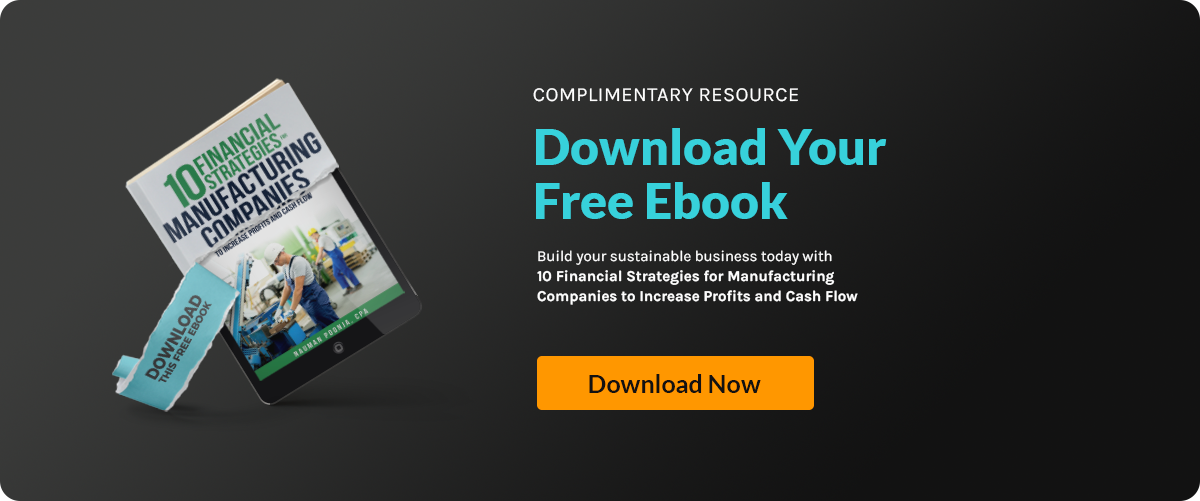Three Basic Accounting Financial Statements Every Businessperson Should Know Starting and running a...
How to Find a Good CPA: An Evaluation Checklist for Business Owners

Choosing a Certified Public Accountant (CPA) is one of the most important financial decisions a business owner will make. Your CPA influences everything from cash flow and tax strategy to compliance and long-term growth. But not all CPA relationships are created equal. Whether you’re working with a CPA today or looking for one, knowing how to evaluate that relationship is key.This guide gives you a clear, practical CPA evaluation checklist that helps you understand what to look for, what to avoid, and how to build a partnership that drives your business forward.
Why Your CPA Relationship Matters
A great CPA is more than just a tax preparer. They should be a strategic partner—someone who helps you see around corners, plan for growth, and avoid costly mistakes. For manufacturing companies in particular, your CPA should understand:
- Inventory costing and cost of goods sold (COGS)
- Fixed vs. variable cost structures
- Industry-specific tax incentives and credits
- The financial nuances of capital expenditures
If they don’t bring this depth to the table—or if you’re only hearing from them at tax time—it may be time to reconsider.
CPA vs. Bookkeeper vs. Fractional CFO: Who Does What?
| Role | Primary Focus | Best For |
|---|---|---|
| CPA | Tax compliance, financial statements, audit prep | Filing taxes, planning deductions, GAAP compliance |
| Bookkeeper | Day-to-day transaction tracking and reconciliation | Keeping accurate records, managing payables/receivables |
| Fractional CFO | Strategic financial planning and forecasting | Growth planning, profit strategy, investor readiness |
The CPA Relationship Evaluation Checklist
Here’s a 10-point checklist to evaluate your current CPA or guide your search for a new one.
1. Are They Proactive or Reactive?
A good CPA doesn’t just respond to your questions—they anticipate them. They bring issues to your attention before they become problems. If you’re always initiating contact or getting vague answers, that’s a red flag.
✅ Look for a CPA who schedules regular check-ins and proactively offers tax planning strategies.
2. Do They Understand Your Industry?
Every industry has its own accounting complexities. A manufacturing CPA should understand:
- Inventory valuation methods (FIFO, LIFO, weighted average)
- Overhead allocation and labor cost structures
- Compliance with industry-specific tax rules
- Issues like sales tax, R&D credits, and equipment depreciation
If your CPA needs you to explain how your business works, they’re not the right fit.
3. Do They Support Strategic Growth?
Your CPA should do more than balance books—they should help drive profit. That includes providing:
- Cash flow forecasting
- Tax strategy for expansion
- Guidance on debt vs. equity financing
- Support when preparing for investment or sale
A CPA who understands top line vs. bottom line performance helps you make smarter financial decisions.
4. Are They Fluent in Technology?
In today’s environment, a CPA who resists technology is a liability. Ask yourself:
- Do they use cloud accounting platforms?
- Can they integrate with your ERP or inventory systems?
- Are they helping you automate reports or are you stuck in spreadsheets?
The right CPA will support accounting automation to save time and improve accuracy.
5. Do They Help You Stay Compliant?
From payroll taxes to sales and use tax, compliance isn’t optional. A reliable CPA should:
- File taxes on time
- Catch compliance issues before the IRS does
- Stay on top of new legislation
If you’ve ever been surprised by a penalty or audit notice, that’s a failure on their part.
📌 Related: Read about sales and use tax compliance risks in manufacturing.
6. Do They Work Well With Your Team?
A CPA should fit into your financial leadership—not create friction.
- Do they communicate well with your internal bookkeeper or fractional CFO?
- Are they responsive during busy times like audits or year-end?
- Do they educate your team on key concepts?
A collaborative CPA improves team alignment and decision-making.
7. Are They Delivering Value for What You Pay?
Cheap accounting usually ends up costing more. Evaluate:
- Are their fees transparent?
- Do they charge for every five-minute call?
- Are you getting strategic insight or just tax filings?
If you’re only hearing from them once a year, you’re overpaying—no matter the rate.
📊 Curious what a better support model looks like? Here’s what bookkeeping should cost in 2025.
8. Do They Explain Things Clearly?
Financial jargon can be confusing. A great CPA should explain your financials, tax obligations, and risks in plain language. If every conversation feels like decoding a foreign language, that’s a communication gap you can’t afford.
9. Can They Grow With You?
Your CPA should be able to support your next phase—whether that’s:
- Entering new markets
- Adding new product lines
- Raising capital
- Scaling operations
Look for signs they’re equipped to handle growth: scalable services, a strong partner network, and capacity to handle more complex reporting.
10. Are You Confident They Have Your Back?
This one is simple. If you feel uneasy, uncertain, or in the dark—it’s time to reevaluate. You want a CPA who:
- Meets deadlines
- Answers your emails promptly
- Prepares you for what’s ahead
- Helps you reduce risk and boost profitability
When to Find a New CPA
If you answered “no” to more than a few of the checklist items, it may be time to explore new options. Key signs you’ve outgrown your current CPA include:
- They only provide reactive support
- They don’t understand your business model
- You feel like just another account
- You’ve missed deadlines or paid avoidable penalties
Just like evaluating any vendor or partner, you owe it to your business to assess whether your CPA is still delivering what you need.
How to Find a Good CPA
The best CPAs are not just tax preparers—they’re strategic partners who understand the operational and financial nuances of manufacturing.
Here’s what to look for when searching for a new CPA:
- Industry experience – especially in manufacturing or capital-intensive businesses
- Strategic mindset – they should help with planning, not just compliance
- Strong references – ask for case studies or client testimonials
- Proactive communication – how often do they check in without being asked?
- Technology adoption – are they fluent in accounting software and cloud tools?
- Partnership fit – do they work well with your internal finance team?
Questions to Ask When Interviewing a CPA
Before you commit, ask:
- Do you work with manufacturing clients? If not, they may not understand the complexity of cost accounting or production planning.com/blogs/calculating-labor-and-overhead-cost) or production planning.
- How do you handle manufacturing-specific tax credits like Section 179 or R&D?
- Can you support multi-location cost tracking and inventory systems?
- What KPIs do you track for your manufacturing clients?
- How do you support year-round tax planning, not just year-end prep?
- Do you help clients prepare for external audits or investor due diligence?
These questions filter out generalists and help you find a CPA who can drive operational and financial excellence in your business.
Red Flags You Shouldn’t Ignore
Not all CPAs are created equal. Watch for these warning signs:
❌ No manufacturing clients in their portfolio
❌ Rarely initiates tax planning conversations
❌ Misses deadlines or delivers vague, outdated financials
❌ Doesn’t understand industry-specific compliance needs (e.g., inventory valuation, sales and use tax))
💡 If you're working with a financial controller or CFO, get their input during your search.
Final Thoughts
Your CPA relationship shouldn’t feel like a chore. It should feel like a strategic advantage. Whether you’re a growing manufacturer, a startup with complex tax needs, or a business owner managing cost pressures, the right CPA helps you stay compliant, grow faster, and make smarter decisions.
If you haven’t evaluated your CPA relationship lately, now’s the time. Use this checklist to get clear on what’s working, what’s missing, and how to move forward with confidence.
Need a second opinion on your current CPA relationship—or help finding the right one? Schedule a strategic finance consultation with Accounovation to learn how your accounting partnerships can work harder for your business.







